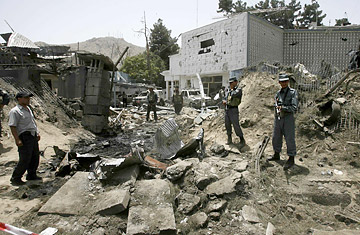
Afghan policemen stand guard at the main gate of the Indian embassy in Kabul after a suicide car bomb attack on July 7
An Indian IL-76 transport plane flew to Kabul Monday to retrieve the bodies of four diplomats killed in a suicide bombing at India's embassy in the Afghan capital. The dead, who numbered 41, included a brigadier general, R.D. Mehta, who had started his post just five months ago and a foreign service officer, V.V. Rao, whose two-year tour of duty in Kabul was about to end. The bombing is likely to have regional ramifications, both for India's relations with the neighborhood and those of every other country supporting Afghan President Hamid Karzai.
Although the Indian government has given no official indication of who might be behind the attack, President Karzai called the bombing the work of the "enemies of Afghanistan-India friendship." And Afghanistan's interior ministry issued a similar statement, saying that "terrorists have carried out this attack in coordination and consultation with some of the active intelligence circles in the region." Typically, such statements — a similar one was issued after a failed assassination attempt on Karzai in April — are taken as thinly veiled allegations of involvement by Pakistan's Inter-Services Intelligence (ISI) organization.
Many foreign policy hawks in India believe Pakistani intelligence operatives might be targeting India's interests not just within its borders or in the disputed region of Kashmir, but also in Afghanistan. "There's been a clear escalation of terrorist attacks," says Brahma Chellaney, professor of strategic studies at the New Delhi–based Center for Policy Research. "Not just on Indian territory but elsewhere in the region as well."
Other foreign policy analysts suggest that the Kabul embassy attack was not simply a strike at an Indian installation, but also an attempt — by the Taliban, the ISI or anyone else — to undermine President Karzai and anyone who supports him. "[The perpetrators] want to disrupt the current Karzai effort that's being supported by the West," says Uday Bhaskar, deputy director of the Institute for Defense Studies and Analysis. "India is now part of that."
India and Pakistan have been vying for influence in Kabul for decades, and India — which for years backed the opposition Northern Alliance against the Pakistan-backed Taliban regime — came out on top after the U.S.-led invasion scattered the Taliban and installed President Karzai in power. India has pledged about $850 million in reconstruction aid to Afghanistan — the largest amount from any nation without a military presence in the country, according to Chellaney — and the Indian embassy in Kabul attracts a daily crowd of Afghans applying for visas.
Karzai's government, and the NATO mission that supports it, however, are looking increasingly beleaguered in the face of a resurgent Taliban. Last month, for the first time, more coalition troops were killed in Afghanistan than in Iraq. Like the U.S. and the U.K., Bhaskar says, India has to become "more engaged with the reality of the problem" in Afghanistan. The embassy bombing shows that even nations without soldiers in Afghanistan can suffer casualties in its war. Says G. Parthsarathy, former Indian ambassador in Pakistan: "Very clearly, we are on the hit list."
— With reporting by Madhur Singh / New Delhi and Ali Safi / Kabul
